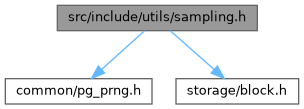

Go to the source code of this file.
Data Structures | |
| struct | BlockSamplerData |
| struct | ReservoirStateData |
Typedefs | |
| typedef BlockSamplerData * | BlockSampler |
| typedef ReservoirStateData * | ReservoirState |
Functions | |
| void | sampler_random_init_state (uint32 seed, pg_prng_state *randstate) |
| double | sampler_random_fract (pg_prng_state *randstate) |
| BlockNumber | BlockSampler_Init (BlockSampler bs, BlockNumber nblocks, int samplesize, uint32 randseed) |
| bool | BlockSampler_HasMore (BlockSampler bs) |
| BlockNumber | BlockSampler_Next (BlockSampler bs) |
| void | reservoir_init_selection_state (ReservoirState rs, int n) |
| double | reservoir_get_next_S (ReservoirState rs, double t, int n) |
| double | anl_random_fract (void) |
| double | anl_init_selection_state (int n) |
| double | anl_get_next_S (double t, int n, double *stateptr) |
Typedef Documentation
◆ BlockSampler
Definition at line 37 of file sampling.h.
◆ ReservoirState
Definition at line 52 of file sampling.h.
Function Documentation
◆ anl_get_next_S()
Definition at line 296 of file sampling.c.
References fb(), oldrs, reservoir_get_next_S(), and ReservoirStateData::W.
◆ anl_init_selection_state()
Definition at line 281 of file sampling.c.
References fb(), oldrs, oldrs_initialized, pg_global_prng_state, pg_prng_uint32(), ReservoirStateData::randstate, sampler_random_fract(), sampler_random_init_state(), and unlikely.
◆ anl_random_fract()
Definition at line 266 of file sampling.c.
References oldrs, oldrs_initialized, pg_global_prng_state, pg_prng_uint32(), ReservoirStateData::randstate, sampler_random_fract(), sampler_random_init_state(), and unlikely.
◆ BlockSampler_HasMore()
|
extern |
Definition at line 58 of file sampling.c.
References fb().
Referenced by block_sampling_read_stream_next(), and BlockSampler_Next().
◆ BlockSampler_Init()
|
extern |
Definition at line 39 of file sampling.c.
References fb(), Min, and sampler_random_init_state().
Referenced by acquire_sample_rows().
◆ BlockSampler_Next()
|
extern |
Definition at line 64 of file sampling.c.
References Assert, BlockSampler_HasMore(), fb(), K, and sampler_random_fract().
Referenced by block_sampling_read_stream_next().
◆ reservoir_get_next_S()
|
extern |
Definition at line 147 of file sampling.c.
References fb(), ReservoirStateData::randstate, S, sampler_random_fract(), W, ReservoirStateData::W, and y.
Referenced by acquire_sample_rows(), analyze_row_processor(), anl_get_next_S(), and file_acquire_sample_rows().
◆ reservoir_init_selection_state()
|
extern |
Definition at line 133 of file sampling.c.
References fb(), pg_global_prng_state, pg_prng_uint32(), ReservoirStateData::randstate, sampler_random_fract(), sampler_random_init_state(), and ReservoirStateData::W.
Referenced by acquire_sample_rows(), file_acquire_sample_rows(), and postgresAcquireSampleRowsFunc().
◆ sampler_random_fract()
|
extern |
Definition at line 241 of file sampling.c.
References pg_prng_double(), and unlikely.
Referenced by acquire_sample_rows(), analyze_row_processor(), anl_init_selection_state(), anl_random_fract(), BlockSampler_Next(), file_acquire_sample_rows(), random_relative_prime(), random_relative_prime(), reservoir_get_next_S(), reservoir_init_selection_state(), system_rows_nextsampleblock(), and system_time_nextsampleblock().
◆ sampler_random_init_state()
|
extern |
Definition at line 234 of file sampling.c.
References pg_prng_seed().
Referenced by anl_init_selection_state(), anl_random_fract(), BlockSampler_Init(), reservoir_init_selection_state(), system_rows_nextsampleblock(), and system_time_nextsampleblock().